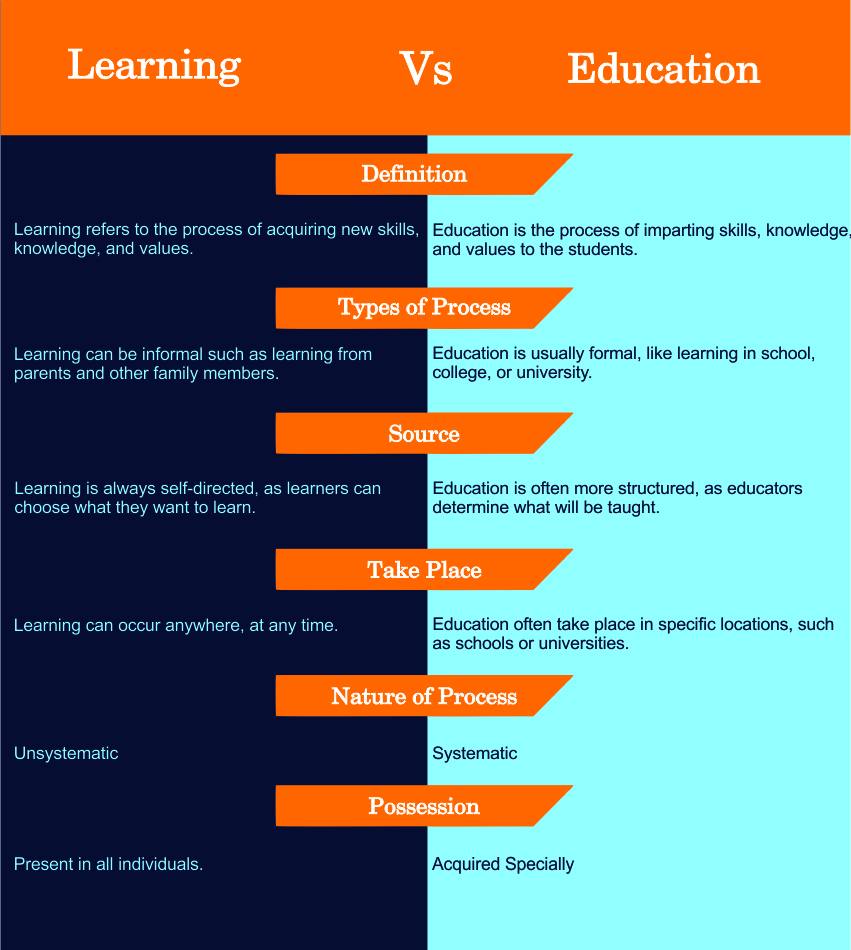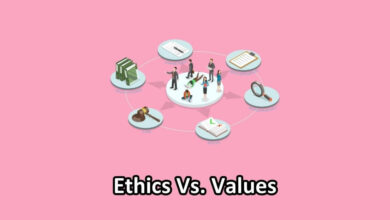Difference Between Learning And Education(With Table)
Learning is a process of acquiring new information, skills, values and behaviours from various sources. It is a natural lifelong process that never stops with an individual’s lifespan. Education on the other hand is the act of teaching a person or providing knowledge through instruction or training. In other words, education is an organized system of instruction or training dealing with the transmission of knowledge and skills from one person to another. This blog primarily focuses on the core difference between learning and education. The content of this blog is given in the following table.
What Is Learning?
Learning can be referred to as the process of acquiring new knowledge, skills, and behaviours. It is a lifelong process that begins when we are born and continues throughout our lives.
People learn in different ways, and some people may prefer one type of learning over another. There is no single “right” way to learn, and what works best for one person may not work for another. It is important to find a learning method that works best for you and that you are comfortable with.
Types Of Learning
There are many different types of learning, such as formal learning, informal learning, conscious learning, unconscious learning, explicit learning, and implicit learning. All these types have been described as follows.
- Formal learning is what takes place in schools, colleges, and universities. It is structured and usually has a specific goal, such as obtaining a qualification.
- Informal learning is less structured and often happens outside of formal educational institutions. It can include things like learning from experience, observation, and trial and error.
- Conscious learning occurs when we are aware that we are learning something. It is often intentional and effortful.
- Unconscious learning happens when we are not aware that we are learning. It can be unintentional and happen without our conscious effort.
- Explicit learning is when we learn something intentionally and deliberately.
- Implicit learning is when we learn something unintentionally or automatically.
What Is Education?
Education refers to the process of imparting knowledge, skills, and values to students. It is usually done through formal schooling, but can also be done through informal methods such as parents teaching their children at home. Education has always been important in human societies, as it helps to transmit the accumulated knowledge of each generation to the next.
In recent years, there has been a shift in focus from traditional academic education to more approaches that aim to develop the whole person. This shift is in response to the changing needs of society and the increasing importance of creativity, collaboration, and critical thinking in the workplace.
There is no one-size-fits-all definition of education, as the needs of each individual and society vary. However, there are some common elements that are often found in education systems around the world. These include:
- A focus on developing the whole person, rather than just academics
- An emphasis on critical thinking, creativity, and collaboration
- A commitment to lifelong learning, etc.
You Can Also Read: Difference Between Degree and Diploma
Learning Vs Education – Main Difference
The main difference between learning and education is that learning is a process of acquiring knowledge, skills, and attitudes while education is a social process that helps prepare individuals for their future roles in society.
Education is a formal process that takes place in schools, colleges, or universities. It helps individuals learn about certain subjects, such as math, science, history, English, and so on. Education also helps people develop critical thinking and problem-solving skills.
Learning, on the other hand, is a more informal process. It can take place anywhere – at home, at work, or in our everyday lives. We learn new things all the time, whether we’re aware of it or not. For example, we learn how to drive a car or use a computer by trial and error. We also acquire new knowledge and skills through observation and imitation.
Both learning and education are important in our lives. They help us gain the knowledge and skills that we need to function in society. However, learning is more flexible and can take place anywhere. education is more formal and takes place in schools, colleges, and universities.
Learning Vs Education(Comparison Table)

Eight Key Differences Between Learning And Education
Eight of the key differences between learning and education are given as follows.
- Learning is a process that, via instruction and experience, results in relatively long-term changes in an individual’s behaviour. Education, on the other hand, is a systematic process of transmitting or receiving knowledge, developing basic thinking and judgement abilities, and preparing an individual to live a developed and civilised life.
- Learning is an active process while education is a passive one.
- While learning is a continuous process, education is discontinuous.
- Learning is self-directed while education is externally directed.
- Education is inflexible. On the other hand, learning is flexible.
- Learning is contextualized while education is decontextualized.
- Learning involves the construction of knowledge while education involves the transmission of knowledge.
- Lastly, learning is an individual process. On the other hand, education is a social process.
Conclusion
So to wrap up this article, we can say that there is a big difference between learning and education. Learning is something that you do on your own, while education is something that is usually imparted by someone else. Education usually takes place in a formal setting, such as a school or university, while learning can take place anywhere. Education has always been important in human societies, as it helps to transmit the accumulated knowledge of each generation to the next.




2 Comments